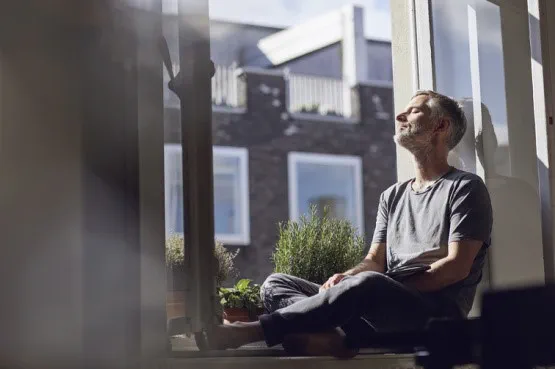How to look after yourself as a young carer
Caring for someone else can be challenging – whatever your age. But when you’re a young carer, it can be especially hard to balance studying and socialising with your caring responsibilities. Here we’ll share some tips on how to make sure you look after yourself, as well as the person you are caring for.

Don’t be afraid to ask for help
It’s understandable that you might feel responsible for the person you are caring for, especially if they are a close relative, such as a parent. But remember, you don’t have to do everything yourself. It’s important that the person requiring care has a team of support around them, which may include:
- doctors/ community nurses
- family
- friends
- home help
- psychologists
- pharmacists
- support groups
Don’t be afraid to reach out for any help and support that may be available – as this can reduce the pressure you’re under. You might start with a GP – to see what is on offer locally. There are also some useful, free, online helplines. For example, Dementia UK have a specialist nurse you can chat to about any concerns.
Speak out at school
If you are struggling to focus on studying with the distractions at home, be sure to speak to your teachers and see what help is on offer. They might be able to give you longer deadlines to complete assignments, extra time in exams, or more one-to-one support.
You might also find it extra stressful during transitions from school to college, or college to university. This could be because you feel guilty about having more work and extra responsibilities outside of your caring role. Or you might need to travel away from home from university – making it hard to continue regular care.
Getting extra help and support at this time can help you to continue your studies with less stress.
It’s ok to have fun
Things might feel serious at home, but it’s important you still find time to enjoy yourself.
As a young person you should still have time for relaxing, being with friends and going out and about. Don’t feel guilty about taking this time out – it will help you to cope better with the demands of caring and can help you to manage any stress and anxiety.
Some local young carers groups will arrange activities and outings – this can help you to feel less alone, as you’ll be around other young people who are dealing with similar issues to you.
Prioritise your physical health
We know that our mental and physical health are connected. But when you’re busy with caring responsibilities, your own health can suffer. Making time to take care of your physical health can help you to cope with the demands of being a carer. Even small changes can make a difference. The following tips may help:
- going to sleep and waking up at the same time each day
- doing 30 minutes of moderate physical activity at least 5 days a week
- eating a balanced diet rich in fibre, protein, and healthy fats
- taking time to destress by reading, seeing friends or having a bath
- consider movement snacking if you find it hard to do longer sessions
Take care of your mental well-being
Around one in six young people have some form of mental health issue. Lots of different factors can affect your mental health – from the pressures of school to issues with friends and self-confidence. Being a young carer can be another source of stress – so you’re not alone if you find yourself feeling anxious, irritable, or low in mood.
There is lots of help and support available – so don’t feel embarrassed to ask for help if you need it. Consider talking to a friend or family member, or your GP if you prefer. GPs can refer you to talking therapies, support groups and if appropriate, discuss medication options with you to further support your mental well-being.
Being a young carer: a personal story
You might have heard of Graeme Sutherland – the TikTok star who openly shares his experiences of being a young carer to his Mum, after her diagnosis of early onset dementia. Below he shares some of his own struggles – as well as some top tips for coping.
“We took care of mum at home for the first eight years after her diagnosis. Mentally, that was tough and really took its toll. At one point my mum forgot who I am. Nothing can prepare you for that.
I wasn’t looking after myself. I wasn’t sleeping. I couldn’t focus. For me, a couple of minutes meditation everyday helps.
Exercise is also essential, so most days now I would go to the gym or go for a run. And sharing how I feel online every day is what really helps me.
I got the support and information I needed from Alzheimer’s Scotland and still do. I tend to direct people now to their local charities as they know what they’re entitled to.
They also have people to help if you’re a carer or if you need to talk to someone”.
If you’re worried about your mental health, our direct access service aims to provide you with the advice, support and treatment you need as quickly as possible. You’ll be able to get mental health advice and support usually without the need for a GP referral. Learn more today.
-
Sources Sources
- Physical health and mental health. Mental health foundation, mentalhealth.org.uk, accessed November 2024
- Carers: statistics. Mental health foundation. Mentalhealth.org.uk, accessed November 2024
- Looking after yourself as a carer. Mind UK. mind.org.uk, published May 2021
- Benefits of waking up early. The sleep foundation. Sleepfoundation.org, published June 2023
- Physical activity guidelines. Gov.uk, last updated March 2023
- Healthy eating. British association of dietitians. Bda.uk.com, updated September 2024
- Facts and figures about young people and mental health. Mind. Mind.org.uk, accessed November 2024
- Factors that affect mental health. Mental health foundation. Mentalhealth.org.uk, accessed November 2024
About our health information
At Bupa we produce a wealth of free health information for you and your family. This is because we believe that trustworthy information is essential in helping you make better decisions about your health and wellbeing.
Our information has been awarded the PIF TICK for trustworthy health information. It also follows the principles of the The Information Standard.

More mental health and wellbeing articles
Did you find our advice helpful?
We’d love to hear what you think. Our short survey takes just a few minutes to complete and helps us to keep improving our healthy lifestyle articles.
Legal disclaimer
This information was published by Bupa's Health Content Team and is based on reputable sources of medical evidence. It has been reviewed by appropriate medical or clinical professionals and deemed accurate on the date of review. Photos are only for illustrative purposes and do not reflect every presentation of a condition.
Any information about a treatment or procedure is generic, and does not necessarily describe that treatment or procedure as delivered by Bupa or its associated providers.
The information contained on this page and in any third party websites referred to on this page is not intended nor implied to be a substitute for professional medical advice nor is it intended to be for medical diagnosis or treatment. Third party websites are not owned or controlled by Bupa and any individual may be able to access and post messages on them. Bupa is not responsible for the content or availability of these third party websites. We do not accept advertising on this page.







